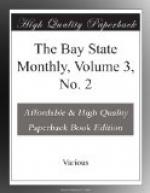When, as children, we read those tales from the old school reading book, or heard them recited as we sat at grandfather’s knee, what pictures impressed themselves on our eager minds! The log meeting-house, and before it the stacked muskets and pacing sentinel; the dusky savage faces hiding behind every tree; the midnight assault: the lurid fire, and the brandished tomahawk—these are pictures that have sometimes come with startling vividness to our youthful imaginations. And then our fancies have seen the so-called witches of Salem, the sudden arrest, the hurrying to the jail and perhaps to the gallows.
To the older mind, these realities of the past have a deep and ever-growing interest. The later periods of the Colony, the period of the Revolution and the period immediately following, are increasingly fertile in materials for the historian, the essayist, and the novelist. To bring out into clearer light, to present in forms adapted to the mass of readers, and to arouse a more lively interest in this history, especially the romantic element of it, is one leading aim and intent of this magazine. There are in existence various magazines devoted to New England history, and which are of great value to the student and the antiquary. The BAY STATE MONTHLY is not only this, it is a magazine for the people; and throughout this State, and no less in many others,—offsprings of this old Commonwealth,—it has received and awaits a still more generous reception.
* * * * *
The custom of observing the anniversaries of the incorporation of towns and cities in New England has become well established. In Massachusetts there are a very few towns which have reached so important an epoch in their history, as the quarter millennial of their corporate existence. Several have celebrated their bi-centennials, while hardly a year passes without the observance of one or more centennial anniversaries.
The custom is strongly to be commended, for it serves an important historical purpose. It is especially true in New England that every town, no matter how small, has an important place in the general history, and the perpetuity of this history, it hardly needs to be said, is a matter of great importance to this and succeeding generations. This is being done most effectually by means of these publicly-observed anniversaries. An event of this kind draws together the residents of the town, and many others who are connected with its history by their early life or ancestry. The occasion calls forth an historical address prepared by some native of the town, who has attained distinction in professional or public life—and what New England town cannot boast of its distinguished son—and, at the same time, arrangements are made for a published history of the town. These historical sketches are of great value and, collectively, they contain the true history of the people. The humble historian of the little town




